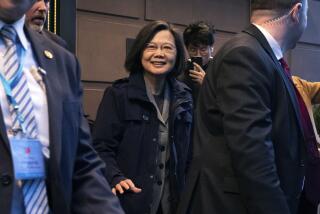Japan Issues Visa to Taiwan’s Lee
- Share via
TOKYO — An aging politician’s desire to visit his alma mater has turned into a diplomatic confrontation between Japan and China, adding one more irritant to an already strained relationship between Asia’s biggest powers.
On Tuesday, Tokyo granted a 15-day tourist visa to former Taiwanese President Lee Teng-hui, 81, who planned to arrive in Japan on Dec. 27 with his wife, daughter and granddaughter for what officials here described as a private holiday.
Lee was one of four Chinese students given a scholarship to attend Kyoto University during Japan’s 1895-1945 occupation of Taiwan, and he is expected to visit the school during a vacation scheduled to last until Jan. 2.
But Japan’s decision to allow Taiwan’s feisty former president into the country has angered Beijing. China opposes any move seen as bestowing international legitimacy on Lee, who has remained a prominent advocate of Taiwanese independence from China since leaving office four years ago.
The Chinese government had warned Japan that it faced a “fierce reaction” if it allowed Lee to visit, saying he would use the occasion to promote Taiwanese separatism.
During his 12 years in office, Lee pushed the boundaries of democratic Taiwan’s self-rule, angering Beijing, which considers the island to be Chinese territory that must be reunited with the mainland -- by force if necessary.
“We want Japan to reconsider it,” China’s ambassador to Japan, Wang Yi, said Tuesday during a speech in Tokyo. He called Lee a “troublemaker” who could become a “war maker.”
“It is hard for Chinese people to understand why Japan favors a man who is speaking ill of and attacking China,” Wang said.
Japan maintains a ban on official contacts with Taiwan. But the Japanese media reported that Lee had promised to refrain from any political activities while in the country, and Prime Minister Junichiro Koizumi saw “no reason to turn down his application” because the former president would visit as a tourist, not a politician.
To try to ensure that the visit does not cross that line, Koizumi’s senior officials encouraged the Japanese media to stay away from Lee while he was in Japan. “We want nobody to go and see him,” said Nobutaka Machimura, Japan’s foreign minister. Lee’s previous trip to Japan was in 2001, for treatment for a heart condition.
A combination of historical grievances and an emerging economic rivalry in Asia means Sino-Japanese relations were frosty even before this spat. China has repeatedly condemned Koizumi’s visits to the Yasukuni shrine in Tokyo, a memorial to Japan’s war dead, including 14 World War II officers convicted of the most serious war crimes.
Koizumi has refused to bow to Chinese pressure to stay away from Yasukuni, a stance that is in tune with widespread public sentiment that China is seeking to interfere in Japanese affairs.
Koizumi’s government also recently released a formal defense policy document that prominently cited concern over China’s rapid militarization and territorial ambitions in Asia.
Paradoxically, the sour political mood coincides with deepening economic ties between the two countries. Chinese demand for Japanese exports and investment is widely credited with lifting the Japanese economy out of recession.
But Japanese attitudes toward China appear to be hardening. A poll conducted this month for Koizumi’s office found that 37.6% of Japanese felt “friendship” toward China, the lowest figure since the government began measuring the public mood on relations with other Asian countries in 1975.
The Japanese government did make some effort Tuesday to avoid appearing overly provocative on the matter of Lee’s visa.
“Our country does not take a two-China position nor does it support Taiwan’s independence,” said Hiroyuki Hosoda, Japan’s chief Cabinet secretary. “We do not think this issue will have a great impact on Japan-China relations.”
But some officials are unconcerned about whether Beijing takes offense over the visit.
“Japan is a sovereign country and has no reason to refuse Mr. Lee, who is a big shot and who has left the political area,” said Tokyo Gov. Shintaro Ishihara, a prominent Japanese nationalist and a vocal backer of Taiwan’s independence ambitions.
“There is no reason whatsoever to refuse him,” Ishihara said, dismissing Chinese concerns. “Let the old couple have their sentimental journey.”
More to Read
Sign up for Essential California
The most important California stories and recommendations in your inbox every morning.
You may occasionally receive promotional content from the Los Angeles Times.













